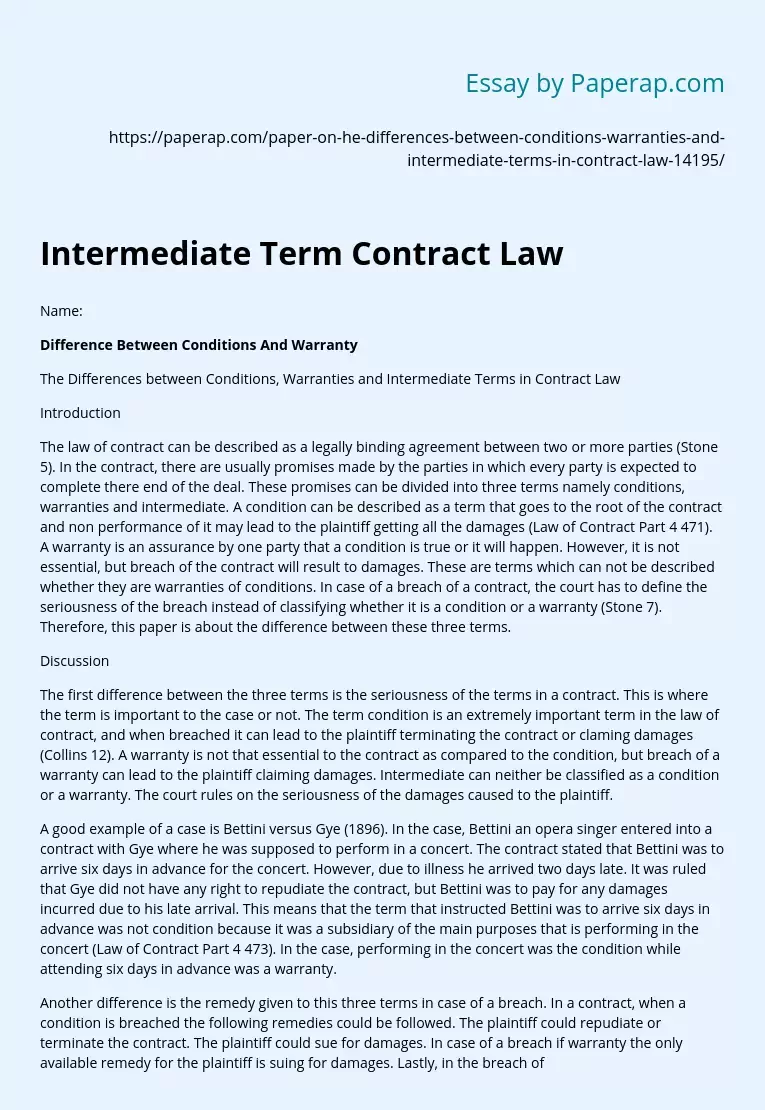Intermediate Term Contract Law
Name:
Difference Between Conditions And Warranty
The Differences between Conditions, Warranties and Intermediate Terms in Contract Law
Introduction
The law of contract can be described as a legally binding agreement between two or more parties (Stone 5). In the contract, there are usually promises made by the parties in which every party is expected to complete there end of the deal. These promises can be divided into three terms namely conditions, warranties and intermediate. A condition can be described as a term that goes to the root of the contract and non performance of it may lead to the plaintiff getting all the damages (Law of Contract Part 4 471).
A warranty is an assurance by one party that a condition is true or it will happen. However, it is not essential, but breach of the contract will result to damages. These are terms which can not be described whether they are warranties of conditions. In case of a breach of a contract, the court has to define the seriousness of the breach instead of classifying whether it is a condition or a warranty (Stone 7).
Therefore, this paper is about the difference between these three terms.
Discussion
The first difference between the three terms is the seriousness of the terms in a contract. This is where the term is important to the case or not. The term condition is an extremely important term in the law of contract, and when breached it can lead to the plaintiff terminating the contract or claming damages (Collins 12).
A warranty is not that essential to the contract as compared to the condition, but breach of a warranty can lead to the plaintiff claiming damages. Intermediate can neither be classified as a condition or a warranty. The court rules on the seriousness of the damages caused to the plaintiff.
A good example of a case is Bettini versus Gye (1896). In the case, Bettini an opera singer entered into a contract with Gye where he was supposed to perform in a concert. The contract stated that Bettini was to arrive six days in advance for the concert. However, due to illness he arrived two days late. It was ruled that Gye did not have any right to repudiate the contract, but Bettini was to pay for any damages incurred due to his late arrival. This means that the term that instructed Bettini was to arrive six days in advance was not condition because it was a subsidiary of the main purposes that is performing in the concert (Law of Contract Part 4 473). In the case, performing in the concert was the condition while attending six days in advance was a warranty.
Another difference is the remedy given to this three terms in case of a breach. In a contract, when a condition is breached the following remedies could be followed. The plaintiff could repudiate or terminate the contract. The plaintiff could sue for damages. In case of a breach if warranty the only available remedy for the plaintiff is suing for damages. Lastly, in the breach of an intermediate, the court decides based on the damage incurred by the plaintiff. It is clear that the two terms are not totally different from each other in relation to the remedies after a breach (Lloyd’s 32).
A good example to show this is the case of Hong Kong Company Limited Versus Kawasaki Kien Limited (1962). In this case, Kawasaki entered into a contract with Hong Kong Fir Shipping Company for shipping services. Hong Kong was to provide Kawasaki with a ship in good service together with competent men. On the other hand, Hong Kong provided Kawasaki with a poorly serviced ship with incompetent men. This resulted in Kawasaki repudiating the contract. The court argued that the term, which insisted on seaworthiness of the ship, was neither a condition nor a warranty. This is because the term is too broad to be a condition or a warranty. Therefore, it was an intermediate. In this case, the court ruled depending on the damages caused to the plaintiff (Law of Contract Part 4 473).
Conclusion
Therefore, in the law of contract it is of extreme importance for parties of the contract to have knowledge of the different terms. This is because they can be devastated in case of a breach. For instance, the remedies for conditions, warranties and intermediate are totally different from one another. Additionally, it is crucial for the parties to fulfill their promises because it can lead to a lot of complications. In future, parties to the contract should be aware of the terms and their meaning incase of a breach. Additionally, they should avoid complication by fulfilling their promises in the future.
Works Cited
Collins, Hugh. The Law of Contract. London, UK: Cambridge University Press, 2003. Print.
Law of Contract Part 4. Construction of the Contract.
Lloyd’s. Lloyd’s maritime and commercial law quarterly, Volumes 1979-1980. Charlottesville, VA: Lloyd’s, 2000. Print.
Stone, Richard. The Modern Law of Contract: Seventh Edition. New York, NY: Taylor & Franscis, 2009. Print.
Intermediate Term Contract Law. (2019, Dec 05). Retrieved from https://paperap.com/paper-on-he-differences-between-conditions-warranties-and-intermediate-terms-in-contract-law-14195/

